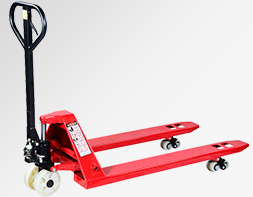News Details
The advantages of manual hydraulic forklifts for cargo handling
Goods cover various items that people need for daily life, such as raw materials, finished products, and commodities. And cargo handling refers to the process of transferring these items from one place to another, which plays a key role in the operation of modern society.
Due to the large weight and volume of many goods, it is difficult to complete the transportation by individual force, often requiring multiple people to cooperate, and even relying on mechanical equipment. Secondly, safety is of paramount importance during the transportation of goods. During the transportation process, it is not only necessary to prevent damage to the goods due to collisions, squeezing, etc., but also to avoid personal injury accidents among the transportation personnel. In addition, time and efficiency cannot be ignored. Completing transportation tasks quickly and efficiently is crucial to ensuring the smooth operation of the supply chain.
In order to improve the efficiency and safety of cargo handling, various auxiliary tools have emerged. Hand carts, forklifts, cranes, and other common handling tools, among which manual hydraulic forklifts have become a widely used choice due to their own advantages. This forklift relies on a hydraulic system to provide power and can easily lift and move heavy objects. Its structure is simple, easy to operate, and has strong carrying capacity. It can perform excellently in various scenarios such as factory workshops, warehouses, and logistics distribution centers.

In the logistics industry, cargo handling plays a crucial role. Logistics aims to transport goods from the production site to the consumption site, and cargo handling is an irreplaceable key link in this process. Only by ensuring the efficiency of goods handling can the entire logistics system operate smoothly and orderly, thereby meeting the market's demand for various commodities. From this, it can be seen that the transportation of goods has profound significance for economic development and social progress. It promotes the circulation of goods and facilitates the optimal allocation of resources.
Freight handling is closely related to people's daily lives and is an important activity that cannot be avoided. Reasonably selecting and using appropriate handling tools can significantly improve handling efficiency and safety, injecting momentum into the development of the logistics industry. Looking ahead to the future, with the continuous innovation and development of technology, cargo handling will surely make great strides towards intelligence and automation, bringing more convenience to people's lives and production, and helping the social economy achieve higher quality development.

